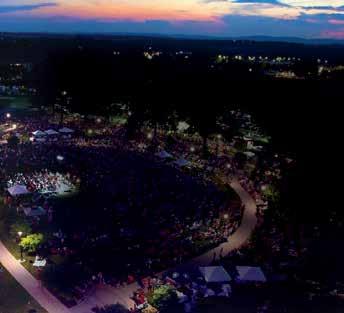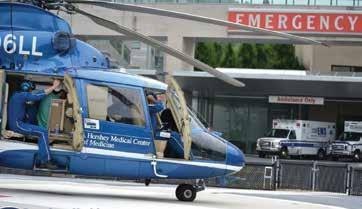
4 minute read
Mind Your Language: The Need for Precision in the Vernacular of Medicine
Richard J. Cunningham, MD
I’m sure many of us during our long and arduous training have been told we have a true “doctor’s handwriting” when others catch a glimpse of our rushed and indecipherable script. While the electronic medical record has made the notoriously illegible penmanship of physicians less relevant than in years past, I ponder why what we write has not received as much scrutiny as how we write it.
From our early years memorizing the mind-numbing details of the electron transport train and Krebs cycle to the many hours reviewing signs, symptoms, and differentials, the humanities have often suffered at the expense of medical education and the way doctors distort, contort, and at times abuse the English language is perhaps the best example of this. “To endorse” is defined by the American Heritage dictionary as, “To express approval of or give support to, especially by public statement.” If so, why would any patient ever “endorse nausea and vomiting?” Yet, many of my colleagues use this word daily when relaying that a patient replies in the affirmative to a myriad of questions; “The patient endorses chest pain, headache, history of hypertension, drug use, etc.” (I myself was at one time guilty of the exact same transgression). That is just the tip of the iceberg. “Room air” is redundant as the FiO2 inside or outside a room is exactly the same. I’ve been reprimanded on ICU rounds for presenting: “Cardiovascularly, the patient is hemodynamically stable.” Cardiovascularly? What Frankenstein have I created? Though I often employ the old adage “the patient is a poor historian”
myself, let’s not forget that a historian is a compiler or writer of a chronicle. Does that make us the poor historians? Finally, I’m sure we all as emergency physicians can agree that the emergency department was never just an “emergency room.” I personally find some of the ways we physicians bend and twist our malleable language as infinitely charming. “Bolus” is not a verb, but the phrase “Bolus ‘em with X, Y, Z!” rolls off the tongue like no other. I enjoy saying, “He’s satting in the 80s” the same way I enjoy casually replying, “I’m doing pretty good.” I know both are wrong, but some of the fun of language comes from its flexibility. Though grammatically abhorrent, colloquially these loose applications of the rules of English bind us together and make a heavy job a little lighter. One misapplication of the English language in medicine however, has come from outside our own. The term “Provider” has insidiously crept into the mainstream language of health care. Invented by bureaucrats, applied by administrators, and passively accepted by many, the term implies that we as physicians “provide” our patients a service. If so, does that make a patient the consumer? Or, perhaps worse, a customer? At a particular community hospital I spend time at in my residency, the screensaver on every computer lists the non-profit health systems company values, among them is “customer-obsessed.” Medicine may indeed be at times more art than science, but should it be a business?
To call us “providers” also blurs the distinction between physicians and other health care professionals. While I personally know and enjoy working with many non-physician practitioners, to label us all as “providers” implies a false-equivalency and ignores the vast gap in education and training between us. Language matters. To ignore such is to ignore reality.
References
1. https://www.ahdictionary.com/word/search.html?q=endorse 2. https://www.aaemrsa.org/current-news/infographic-what-it-takes-to-makea-doctor
PROVIDER
Exciting opportunities at our growing organization

•Adult and Pediatric Emergency Medicine Faculty positions •Medical Director •Vice Chair, Clinical Operations •Vice Chair, Research •Medical Student Clerkship Director


Penn State Health, Hershey PA, is expanding our health system. We offer multiple new positions for exceptional physicians eager to join our dynamic team of EM and PEM faculty treating patients at the only Level I Adult and Level I Pediatrics Trauma Center in Central Pennsylvania.
What We’re Offering:
•Salaries commensurate with qualifi cations •Sign-on Bonus • Relocation Assistance •Retirement options, Penn State University Tuition Discount, and so much more!
What We’re Seeking:
•Emergency Medicine trained physicians with additional training in any of the following: Toxicology, Ultrasound, Geriatric Medicine, Pediatric
Emergency Medicine, Research •Completion of an accredited Residency Program. • BE/BC by ABEM or ABOEM
What the Area Offers:
We welcome you to a community that emulates the values Milton Hershey instilled in a town that holds his name. Located in a safe family-friendly setting, Hershey, PA, our local neighborhoods boast a reasonable cost of living whether you prefer a more suburban setting or thriving city rich in theater, arts, and culture. Known as the home of the Hershey chocolate bar, Hershey’s community is rich in history and offers an abundant range of outdoor activities, arts, and diverse experiences. We’re conveniently located within a short distance to major cities such as Philadelphia, Pittsburgh, NYC, Baltimore, and Washington DC.













